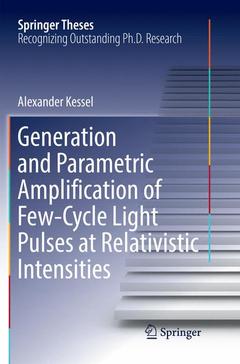Description
Generation and Parametric Amplification of Few‐Cycle Light Pulses at Relativistic Intensities, 1st ed. 2018
Springer Theses Series
Language: English
Subjects for Generation and Parametric Amplification of Few‐Cycle...:
Publication date: 12-2018
Support: Print on demand
Publication date: 07-2018
Support: Print on demand
Description
/li>Contents
/li>Comment
/li>
This book reports on the development of a pioneering light source architecture of the so-called Petawatt Field Synthesizer (PFS) system, which is based on short-pulse pumped, optical parametric chirped pulse amplification (OPCPA), driven by a homemade, 1-ps diode-pumped Yb:YAG. At a few-cycle pulse duration of the amplified pulses, this architecture yields record levels of peak power and temporal contrast, the latter boasting a 100-times faster rise time from the noise level to peak intensity of the pulse compared to conventional laser systems. This allows investigation of the true laser?solid interaction without premature plasma expansion and without lossy pulse cleaning by e.g. plasma mirrors.
The book describes several concepts for the generation of broadband, high-energy and high-contrast seed pulses, as well as the OPCPA development, few-cycle pulse compression and contrast characterization in a concise and insightful manner. The theory chapter serves as an excellent andaccessible primer on OPCPA and other nonlinear interactions, while the experimental parts provide an excellent description of the challenges of developing such a novel architecture and some of the innovative solutions to overcome them.



